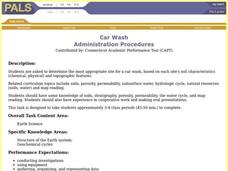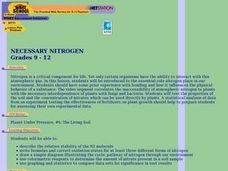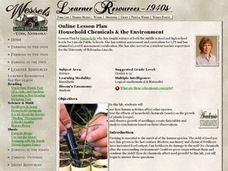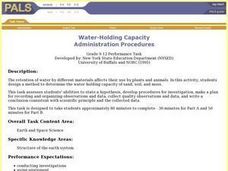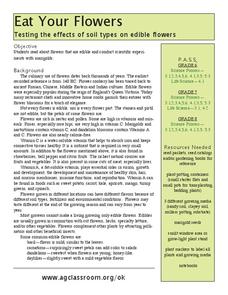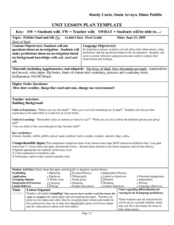Curated OER
Rock Cycle SIOP Unit
Pupils collect rocks, identify them, classify them, investigate their properties, and more. In this rocks lesson plan, students also experiment with soil and erosion and weather.
Curated OER
Car Wash
Students determine the most appropriate site for a car wash, based on each site's soil characteristics (chemical, physical) and topographic features. They perform an experiment to determine the changes to three different soil types when...
Curated OER
Spring Potted Plants
Students identify and interpret plant growth as well as gain graphing skills and other important knowledge related to potting plants. They take a regular milk jug and cut off the top, leaving the handle and the rest intact. Then,...
Curated OER
Working Worms
Fourth graders examine earthworms. In this earthworm lesson, 4th graders investigate how earthworms help prepare soil for planting. Students examine other living and nonliving elements in a garden habitat.
Curated OER
Necessary Nitrogen
Students view a video that presents the biogeochemical cycle of nitrogen. They compare types of soils and consider how different fertilizers affect soil composition.
Curated OER
Household Chemicals & the Environment
Students conduct a laboratory experiment designed to investigate the effects of chemicals, soil quality and pollution on seed growth and plant yield. They consider how best to maximize agriculture in the long term.
Curated OER
Water-Holding Capacity
Students design and conduct an experiment to compare the water-holding capacity of sand, soil, and moss. They measure the change in weight for each material after adding the same amount of water to each material.
Curated OER
A Rocky Situation
Second graders conduct experiments with rocks to observe weathering. They read books, examine websites and watch a video to examine how rocks break down into soil.
Curated OER
How Safe Is Your Backyard?
Seventh graders investigate the safety of soil and water locally and communicate via the Internet with students in different locales sharing information. They research the Internet using its multimedia capabilities and collate the data...
Curated OER
What is a Wetland?
In this Tyson Lagoon wetland instructional activity, learners record their observations during a field trip to a constructed wetland area. They make observations at 6 stations, trace the water flow through the ecosystem and examine the...
Curated OER
Earthquake Science Project
Students simulate the Earth's plates moving like an earthquake by using newspaper and soil. In this earthquake lesson plan, students push and pull the newspaper together that has soil on top and observe what happens.
Curated OER
TE Activity: How Fast Can a Carrot Rot?
Learners experiment to define which environmental factors favor decomposition by soil microbes. They decompose carrots in dirt, weigh the carrots periodically to determine how long it takes. They look at how engineers use this type of...
Curated OER
Bellwork for Week 11
In this bellwork activity, students answer questions about chemical and mechanical weathering, particle size, and the soil profile at the start of class.
Curated OER
Creating Sand Dunes
Students explain how sand dunes are formed, the different circumstances that effect the movement of or formation of sand dunes, and relate the information gathered to soil conservation. In this sand dunes lesson, students use pans of...
Curated OER
Eat Your Flowers
Students grow flowers in different soil mediums to determine the effect on flavor. In this investigative lesson students study flowers, plant them and taste them to see how they differ in different potting soils.
Curated OER
Peat Pots
Students place a peat pot in water to observe and calculate the rate of capillarity in a model of a soil. This task assesses students' abilities to make simple observations, collect, record, and represent data, use a data table to...
Curated OER
Pebbles Sand and Silt
First graders investigate soil, sand and silt. In this environment lesson, 1st graders discuss how changes occur in the environment and the effects of weather. Students perform their own investigation and record their predictions,...
Curated OER
Soil
Young scholars discover the importance of air in soil by planting bean seeds in different soil types. They predict which type of soil is best for plants. They discuss the importance of plants to other living things.
Curated OER
Soil Activity: Color Me!
For this soil worksheet, students color a picture of a snail, with the caption beneath reading, "Soil forms really slowly, so we have to look after it!"
Curated OER
Food Grows in Soil
In this food/soil worksheet, students look at pictures in rows and correctly sequence the pictures; all have to do with food production/growth. A reference web site is given for additional activities.
Curated OER
Know your roots!
Looking at an image of plant systems with their roots in the ground, learners determine which would be the most or least difficult to pull. They write short sentences describing which plant they chose and why. Intended for 3rd or 4th...
Curated OER
Compost Lesson
If you are looking for how to introduce elementary environmentalists to the process of composting, here is a comprehensive outline for making it happen. The plan is to set this up at the beginning of a school year in order to observe the...
Curated OER
COMPARE SOILS BY GROWING PLANTS
The student will identify the difference in the rate of plant growth in three soils that vary in organic matter.1. Obtain three to four flowerpots, different types of soil, a record chart, three to five beans for each pot, and water....
Curated OER
Soil and Agriculture: Lesson 4 - Agriculture and Soil
Pupils determine how the various levels of minerals in the soil, as well as the pH of the soil, affect the growth of plants in these plant growth experiments.
Other popular searches
- Soil Erosion
- Soil Classification
- Soil Composition
- Soil Fertility
- Soil Conservation
- Soil Animals
- Rocks and Soils
- Soil Erosion Worksheets
- Elementary Science and Soil
- Soil Microbiology
- Plants and Soil Erosion
- Soil Management



